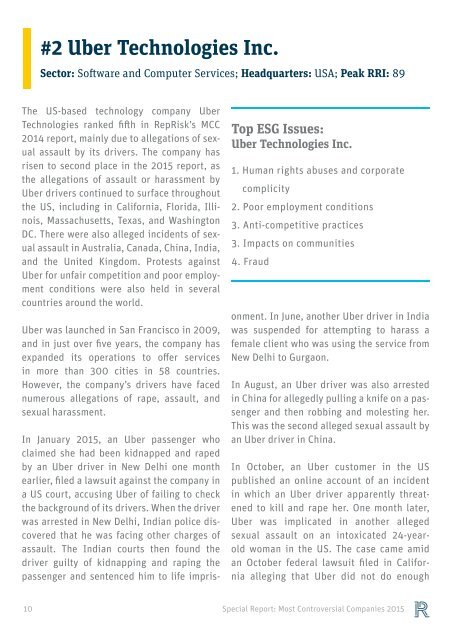Most Controversial Companies
zqznavn
zqznavn
You also want an ePaper? Increase the reach of your titles
YUMPU automatically turns print PDFs into web optimized ePapers that Google loves.
#2 Uber Technologies Inc. Uber Technologies Inc.<br />
Sector: Software and Computer Services; Headquarters: USA; Peak RRI: 89<br />
The US-based technology company Uber<br />
Technologies ranked fifth in RepRisk’s MCC<br />
2014 report, mainly due to allegations of sexual<br />
assault by its drivers. The company has<br />
risen to second place in the 2015 report, as<br />
the allegations of assault or harassment by<br />
Uber drivers continued to surface throughout<br />
the US, including in California, Florida, Illinois,<br />
Massachusetts, Texas, and Washington<br />
DC. There were also alleged incidents of sexual<br />
assault in Australia, Canada, China, India,<br />
and the United Kingdom. Protests against<br />
Uber for unfair competition and poor employment<br />
conditions were also held in several<br />
countries around the world.<br />
Uber was launched in San Francisco in 2009,<br />
and in just over five years, the company has<br />
expanded its operations to offer services<br />
in more than 300 cities in 58 countries.<br />
However, the company’s drivers have faced<br />
numerous allegations of rape, assault, and<br />
sexual harassment.<br />
Top ESG Issues:<br />
Uber Technologies Inc.<br />
1. Human rights abuses and corporate<br />
complicity<br />
2. Poor employment conditions<br />
3. Anti-competitive practices<br />
3. Impacts on communities<br />
4. Fraud<br />
In January 2015, an Uber passenger who<br />
claimed she had been kidnapped and raped<br />
by an Uber driver in New Delhi one month<br />
earlier, filed a lawsuit against the company in<br />
a US court, accusing Uber of failing to check<br />
the background of its drivers. When the driver<br />
was arrested in New Delhi, Indian police discovered<br />
that he was facing other charges of<br />
assault. The Indian courts then found the<br />
driver guilty of kidnapping and raping the<br />
passenger and sentenced him to life imprisonment.<br />
In June, another Uber driver in India<br />
was suspended for attempting to harass a<br />
female client who was using the service from<br />
New Delhi to Gurgaon.<br />
In August, an Uber driver was also arrested<br />
in China for allegedly pulling a knife on a passenger<br />
and then robbing and molesting her.<br />
This was the second alleged sexual assault by<br />
an Uber driver in China.<br />
In October, an Uber customer in the US<br />
published an online account of an incident<br />
in which an Uber driver apparently threatened<br />
to kill and rape her. One month later,<br />
Uber was implicated in another alleged<br />
sexual assault on an intoxicated 24-yearold<br />
woman in the US. The case came amid<br />
an October federal lawsuit filed in California<br />
alleging that Uber did not do enough<br />
to protect intoxicated passengers, despite<br />
the company’s claims that it was helping to<br />
combat drinking and driving.<br />
<strong>Controversial</strong> business model<br />
Throughout the year, the legality of Uber’s<br />
services was challenged in several countries<br />
and regions, including China, Europe,<br />
Japan, South Korea Mexico and the US. In<br />
South Korea, Uber’s CEO and nearly 30 people<br />
linked to the company were charged with<br />
running an illegal taxi firm. The authorities<br />
in Hong Kong arrested five Uber drivers for<br />
operating without the necessary licenses,<br />
and in India, the Department of Telecommunications<br />
ordered Internet service providers<br />
to block the company’s websites in New<br />
Delhi after claiming that Uber drivers were<br />
operating without radio-taxi permits. The<br />
Dutch police raided the company’s offices in<br />
Amsterdam, and municipal authorities in Rio<br />
de Janeiro ruled that the service was illegal.<br />
In March, the French police raided Uber’s<br />
offices in Paris and in June, French prosecutors<br />
charged two of the company’s executives<br />
with using deceptive commercial practices,<br />
operating an illegal taxi service, and illicitly<br />
storing personal data.<br />
The company’s low cost “Uberpop” service,<br />
launched in February 2014, also proved<br />
to be extremely controversial in 2015 as,<br />
unlike existing Uber services, Uberpop uses<br />
Top ESG Topic Tags:<br />
Uber Technologies Inc.<br />
1. Privacy violations<br />
2. Migrant labor<br />
2. Negligence<br />
non-professional drivers. Uber contended<br />
that the new service was simply “ride-sharing,”<br />
and therefore not governed by taxi laws.<br />
However, French prosecutors fined Uberpop<br />
drivers for transporting passengers without<br />
relevant licenses, and in December, a French<br />
appeals court ordered Uber to pay a EUR<br />
150,000 (USD 162,800) fine for deceptive<br />
commercial practices. A German court also<br />
banned the service after ruling that Uberpop<br />
violated transport laws.<br />
Antitrust<br />
Throughout 2015, traditional taxi drivers in<br />
many countries including Brazil, Bulgaria,<br />
China, France, Italy, Mexico, the Philippines,<br />
and the UK claimed that Uber’s business model<br />
gave the company an unfair competitive advantage.<br />
In May, a court in Milan ordered Uber to<br />
discontinue its Uberpop service throughout<br />
Italy, and the Bulgarian Commission for Protection<br />
of Competition fined Uber BGN 100,000<br />
(USD 55,000) for anti-competitive practices.<br />
10 Special Report: <strong>Most</strong> <strong>Controversial</strong> <strong>Companies</strong> 2015<br />
Special Report: <strong>Most</strong> <strong>Controversial</strong> <strong>Companies</strong> 2015<br />
11


